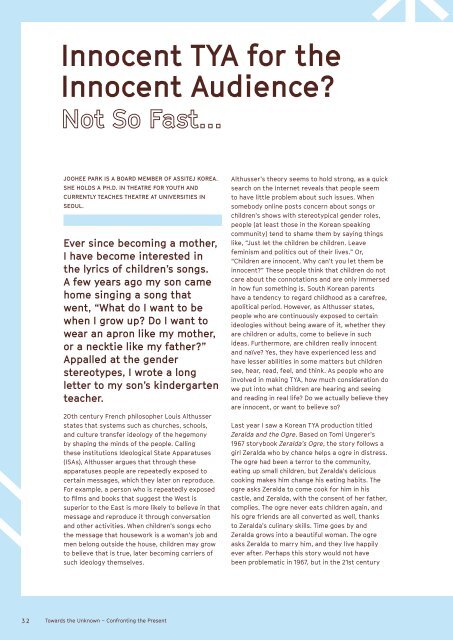ASSITEJ Magazine 2019
This is the annual ASSITEJ magazine, launched during the ASSITEJ Artistic Gathering 2019 in Kristiansand (Norway). It contains high-quality articles on theatre for young audiences from all corners of the world!
This is the annual ASSITEJ magazine, launched during the ASSITEJ Artistic Gathering 2019 in Kristiansand (Norway). It contains high-quality articles on theatre for young audiences from all corners of the world!
You also want an ePaper? Increase the reach of your titles
YUMPU automatically turns print PDFs into web optimized ePapers that Google loves.
Innocent TYA for the<br />
Innocent Audience?<br />
JOOHEE PARK IS A BOARD MEMBER OF <strong>ASSITEJ</strong> KOREA.<br />
SHE HOLDS A PH.D. IN THEATRE FOR YOUTH AND<br />
CURRENTLY TEACHES THEATRE AT UNIVERSITIES IN<br />
SEOUL.<br />
Ever since becoming a mother,<br />
I have become interested in<br />
the lyrics of children’s songs.<br />
A few years ago my son came<br />
home singing a song that<br />
went, “What do I want to be<br />
when I grow up? Do I want to<br />
wear an apron like my mother,<br />
or a necktie like my father?”<br />
Appalled at the gender<br />
stereotypes, I wrote a long<br />
letter to my son’s kindergarten<br />
teacher.<br />
20th century French philosopher Louis Althusser<br />
states that systems such as churches, schools,<br />
and culture transfer ideology of the hegemony<br />
by shaping the minds of the people. Calling<br />
these institutions Ideological State Apparatuses<br />
(ISAs), Althusser argues that through these<br />
apparatuses people are repeatedly exposed to<br />
certain messages, which they later on reproduce.<br />
For example, a person who is repeatedly exposed<br />
to films and books that suggest the West is<br />
superior to the East is more likely to believe in that<br />
message and reproduce it through conversation<br />
and other activities. When children’s songs echo<br />
the message that housework is a woman’s job and<br />
men belong outside the house, children may grow<br />
to believe that is true, later becoming carriers of<br />
such ideology themselves.<br />
Althusser’s theory seems to hold strong, as a quick<br />
search on the Internet reveals that people seem<br />
to have little problem about such issues. When<br />
somebody online posts concern about songs or<br />
children’s shows with stereotypical gender roles,<br />
people (at least those in the Korean speaking<br />
community) tend to shame them by saying things<br />
like, “Just let the children be children. Leave<br />
feminism and politics out of their lives.” Or,<br />
“Children are innocent. Why can’t you let them be<br />
innocent?” These people think that children do not<br />
care about the connotations and are only immersed<br />
in how fun something is. South Korean parents<br />
have a tendency to regard childhood as a carefree,<br />
apolitical period. However, as Althusser states,<br />
people who are continuously exposed to certain<br />
ideologies without being aware of it, whether they<br />
are children or adults, come to believe in such<br />
ideas. Furthermore, are children really innocent<br />
and naïve? Yes, they have experienced less and<br />
have lesser abilities in some matters but children<br />
see, hear, read, feel, and think. As people who are<br />
involved in making TYA, how much consideration do<br />
we put into what children are hearing and seeing<br />
and reading in real life? Do we actually believe they<br />
are innocent, or want to believe so?<br />
Last year I saw a Korean TYA production titled<br />
Zeralda and the Ogre. Based on Tomi Ungerer’s<br />
1967 storybook Zeralda’s Ogre, the story follows a<br />
girl Zeralda who by chance helps a ogre in distress.<br />
The ogre had been a terror to the community,<br />
eating up small children, but Zeralda’s delicious<br />
cooking makes him change his eating habits. The<br />
ogre asks Zeralda to come cook for him in his<br />
castle, and Zeralda, with the consent of her father,<br />
complies. The ogre never eats children again, and<br />
his ogre friends are all converted as well, thanks<br />
to Zeralda’s culinary skills. Time goes by and<br />
Zeralda grows into a beautiful woman. The ogre<br />
asks Zeralda to marry him, and they live happily<br />
ever after. Perhaps this story would not have<br />
been problematic in 1967, but in the 21st century<br />
32 Towards the Unknown – Confronting the Present



